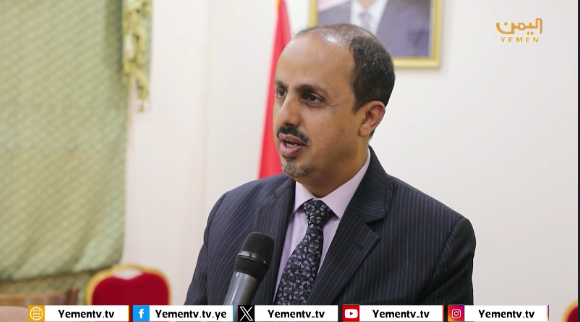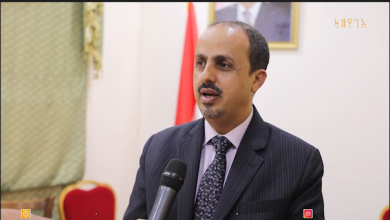The Minister of Information stated that the Houthi militia’s deliberate sinking of the aid ship “Eternity Sea” and killing its crew is a maritime terrorism crime threatening global shipping and supply chains.

Houthi Attack on “Eternity C” Highlights Maritime Terrorism
Minister Condemns Humanitarian Tragedy
Yemen’s Minister of Information, Culture, and Tourism, Muammar Al-Eryani, expressed deep concern over the recent attack on the cargo ship “Eternity C.” This incident, which occurred on July 7, marks a significant humanitarian tragedy. Al-Eryani emphasized that the attack reveals the severe threat posed by Houthi militias to maritime security and international shipping lanes.
Search Operations Conclude with Mixed Results
Al-Eryani reported that search operations concluded with the rescue of 10 crew members out of 25. The crew included 22 individuals—21 Filipinos and one Russian—along with three security guards, one Greek and one Indian. Unfortunately, 15 crew members remain missing, with fears that nine may have perished after rescuers retrieved the survivors from the sea following over 24 hours of distress.
Details of the Attack
The Houthi militia launched a brutal two-day assault on the “Eternity C,” a Liberian-flagged vessel managed by a Greek company. The ship was returning from delivering food aid provided by the World Food Programme to ports in Somalia. During the attack, the militia employed various weapons, including RPGs, fast boats, drones, and ballistic missiles, showcasing their blatant disregard for the lives of innocent sailors.
A Pattern of Aggression
Al-Eryani pointed out that this incident is part of a troubling trend of Houthi attacks on commercial vessels and oil tankers in the Red Sea since November 2023. Previous assaults included the killing of three sailors aboard the “True Confidence” in March 2024 and another sailor on the “Tutour” in June 2024. These actions reflect the militia’s ongoing commitment to undermining maritime freedom and endangering sailors, in clear violation of international law.
International Implications of Maritime Terrorism
The situation in the Red Sea has escalated beyond local or regional threats. Al-Eryani described it as a blatant challenge to international norms and humanitarian law. He warned that these attacks represent organized maritime terrorism, jeopardizing global shipping, energy supplies, and trade routes. The risk of sinking, hijacking, and piracy now looms over aid vessels and commercial ships alike.
Call for International Action
Al-Eryani criticized the international community’s inaction, which he believes has emboldened the Iranian-backed Houthi militia to continue its assaults. He described the militia as a “cancer” ravaging the Red Sea without restraint. Delays in addressing this issue only complicate risks and diminish the chances for resolution.
The Minister stressed that the international community must take a firm stance. He urged global leaders to fulfill their legal and moral responsibilities under the United Nations Charter and maritime laws. Immediate and decisive action is necessary to halt this maritime terrorism and hold the Houthis accountable for their repeated aggressions.
Shared Responsibility for Maritime Safety
Al-Eryani concluded by asserting that the safety of sailors, the security of maritime routes, and the stability of global energy and trade supplies are collective responsibilities. He emphasized that the international community cannot allow this terrorist militia to disrupt global trade and threaten food and fuel security without consequences.
This article highlights the urgent need for international intervention to address the escalating threat posed by the Houthi militia in the Red Sea, ensuring the safety of maritime operations and global trade.
To follow the news in Arabic





